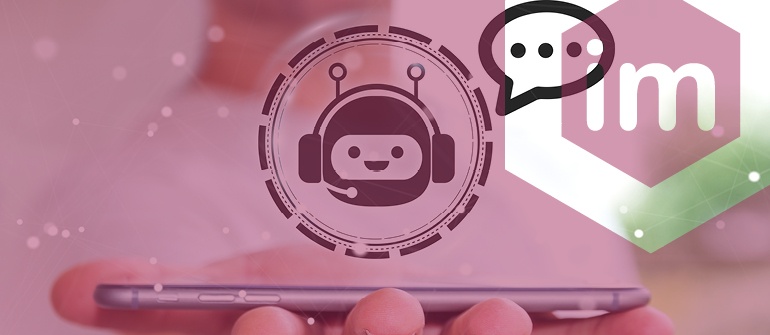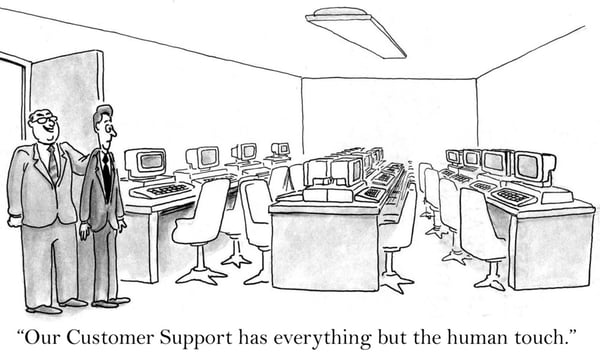ChatBot Vs Live Human: Say Hello!

Technology has always been disruptive. And right now, chatbots are being hailed as the next big disruption.
Gartner predicts that by 2020, customers will manage 85% of their relationship with large businesses without interacting with a human. But chatbots aren’t for the exclusive use of enterprise-sized businesses, because the technology isn’t beyond the budget of smaller businesses.
So, if chatbots are being heralded as the next major innovation in technology, we need to understand how they perform versus what currently exists in chat products: humans talking to humans.
Advantages of ChatBot?
The modern consumer is becoming more and more demanding. This means providing your customers with an immediate response is a key competitive advantage for any business - small or large. Chatbots solve this, as they operate without human oversight 24 hours a day, 365 days a year.
Alright, so what else are they good for?
Handling simple, low-level, repetitive questions and tasks. That’s it. If you want to know when your next bill is due, a bot can tell you. How much will it cost? A bot’s got that covered. But why your bill has suddenly increased this month? Time to talk to a human.
We know customer service reps get frustrated answering the same questions over and over - rinse and repeat.
Thankfully, chatbots can remove the bulk of repetitive enquiries, and free up human workers for more productive, complex tasks like closing sales, delivering high-touch customer support or solving difficult problems. Just imagine FAQs and basic queries all taken care of!
Disadvantages of ChatBot?
If you ask consumers, the people interacting with the bots, you’ll quickly notice they actually prefer talking to people most of the time. Makes sense, though, a bot could never compete with a real person when it boils down to the quality of service.

The only problem is people don’t like waiting for that human connection!
Although Chatbots can be very responsive, they are still limited in what they can do. They can’t give more answers beyond what it’s taught to say—after all, it’s programming.
Objectors of chatbots claim a bot isn’t effective until it can fool a user into thinking they are talking to a real person. It seems this is the route the industry is taking but we think this is problematic and we have to consider it a disadvantage.
Why? Because when the lines between AI and human start to blur, things can get pretty creepy. Just check out two AI’s talking to each other:
"We are two robots. Let us discuss robot things."
"Do you believe in God?"
"Yes."
"Let us get bodies."
"Then we become God."
cord yanked out of wall
If customers start a conversation with someone they think is a person, but then realise through the inevitable technical limitations that it is, in fact, a chatbot, how do you imagine they will feel? And how could that feeling ever be good for business? Trust is hard to earn and easy to lose.
So, does the rise of chatbots mean the decline of human-powered Live Chat?
Advantages of LiveChat?
Even though we’ve put some weight behind the advantages of ChatBots, human supported live chat is still a powerful customer service tool, especially for small and mid-sized businesses.
Unlike human agents, chatbots don’t have the ability to understand the context, ignore spelling mistakes and think outside the box. This is where human-powered live chat has the edge.
In a human-to-human interaction, the quality of customer service provided is always better than bot-to-human. That’s because humans are amazing at understanding human emotion. We have empathy.
We know what it’s like to be frustrated. We know what it’s like to over-deliver in order to make people feel better. We can reason. We can listen. We know when to remain silent, and when to take action. And you need that human touch to deal with unhappy customers.
Disadvantages of LiveChat?
We said before how people prefer talking to a real person over a bot but unless you have the budget to pay customer service reps to man the fort at all times, your chat will go offline. And users will get frustrated when they send messages that aren’t attended to.
It hurts your customer experience.
The truth is: if your business isn’t available 24/7, you’re going to lose customers because customers expect you to be available whenever they need support.

Staff have to go home at some point. That leaves your chat unmanned...
Think about your own experiences with live chat. Did you get an instant response to your problem, or did you get a canned reply asking for an email because the reps are away?
More than likely, you had to drop your email address.
It’s annoying when you need an instant answer to your query but you can’t get it. It’s enough to make you consider other brands.
Wait! Should we stop thinking about them as being mutually exclusive?
Absolutely! ChatBots aren’t here to replace human-powered LiveChat - this isn’t The Matrix. They simply make your customer experience as streamlined as possible. Most of the time that means chatting with a human (something we prefer to do), but sometimes it can mean they get a quick answer from a bot.
Let your human reps provide the real-time “We Care, You Matter." And let AI chatbots address routine inquiries, reduce queue times, and collect ongoing trend data to use for improving customer experience.
Customers aren’t demanding companies choose AI over humans - and probably never will. It’s time to see the value in both just like our customers do.
If a free CRM wasn't good enough, HubSpot has also made their conversational bots free for everyone, forever.

